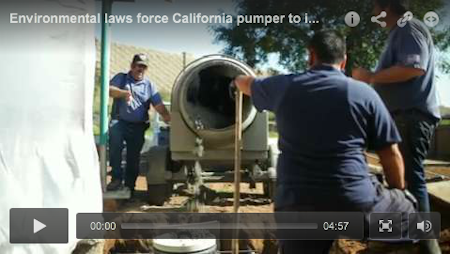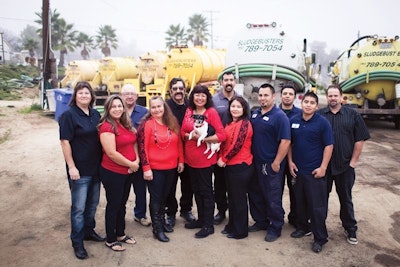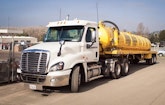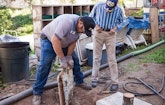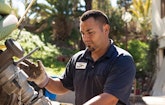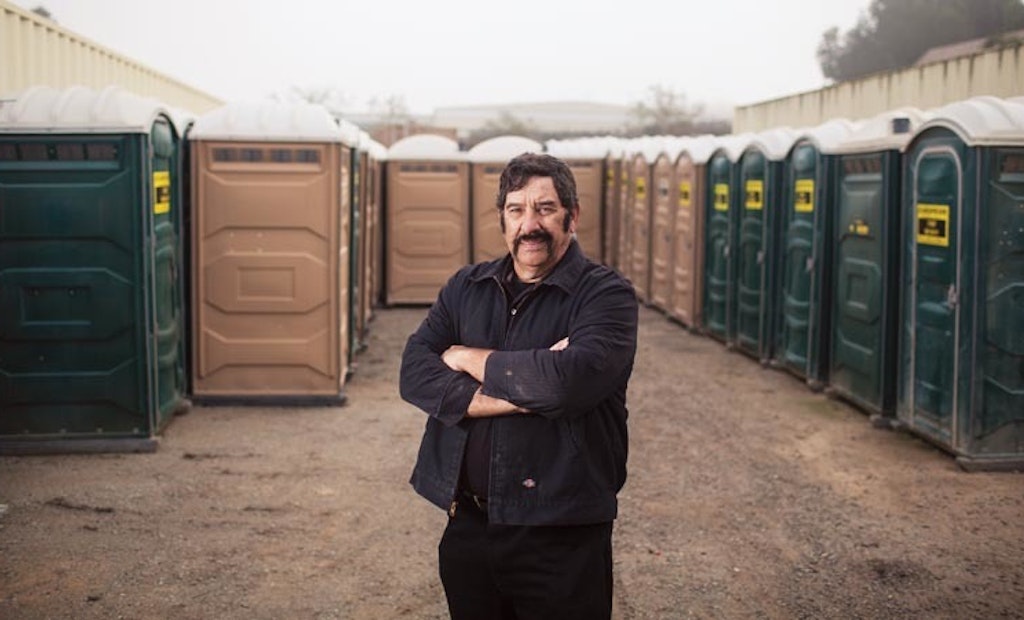
Interested in Trucks?
Get Trucks articles, news and videos right in your inbox! Sign up now.
Trucks + Get AlertsCalifornia pumper Ed Kapelczak figures he’s spent $300,000 to comply with the state’s strict air quality standards among buying new compliant vehicles, retrofitting qualifying existing vehicles and removing non-qualifying vehicles from his fleet.
California has some of the strictest smog control regulations in the country. But Kapelczak offers a warning to other pumpers. “You know that saying, ‘What happens in Vegas… [stays in Vegas].’ Well, what happens in California tends to spread all over the country.”
Kapelczak is not opposed to doing his part to reduce emissions and works hard to comply. But he’s got two main frustrations with the process. First, the competitive landscape has gotten a little shaky as some pumping companies try to fly under the radar using noncompliant vehicles, he says. That gives them lower operating expenses than companies who are in compliance, and therefore the ability to bid lower on projects.
His second concern is constant changes in the regulations, never quite knowing one year to the next where they stand. “You make a plan, you take action and then the goal post went to another area,” he says. “Even regulators can’t keep up.”
Kapelczak and his wife, Yvonne, are the owners of Sludgebusters Inc. and European Portable Sanitation Service in Ramona, California, a rural area about 35 miles northeast of San Diego. They operate out of a 1,000-square-foot office building on a 3 1/2-acre property with a supplemental storage yard in Borrego Springs, 50 miles away.
The team includes office manager Alma Salcedo, three septic technicians (including their son, Joe), three portable restroom technicians, a mechanic, a receptionist and a part-time person who cleans the yard and trucks. Kapelczak works in the field and Yvonne handles administration.
A CLEVER NAME
In the 1970s, Kapelczak was employed by a construction company working on sewer mains and storm drains. By the late 1980s, when his position as “shock absorber,” as he calls it, between management and the workers became a losing battle, he left. “I figured I’d just go dig leachfields in the back country just to be peaceful,” he says. Plus the area seemed ripe for competition as there was only one septic service company in the area.
With Yvonne’s help, he started out in 1988 doing septic repairs and inspections. Seven-year-old daughter Christina also got in on the act, coming up with the company name. “I was explaining to her what a sod buster was and she just looked at me and announced, ‘We are sludgebusters,’” Kapelczak says.
In 1992, he bought a 1977 Chevy C65 with an 1,800-gallon Lely Manufacturing Inc. tank and started pumping septic tanks – which immediately brought in more revenue than repair work, he says. By 1996, they were ready to bring in their first employee.
Along the way they also picked up two Case backhoes (580K and 580M), a 2001 John Deere 250 skid-steer, a Case 580C skip loader, Cobra Technologies plumbing snakes, a camera from Amazing Machinery and locators from Prototek, Dunham & Morrow Inc. and T&T Tools. “And we’ve got dump trucks and pickups and 1-tons just scattered about,” Kapelczak adds.
In 2000, the company started offering portable restrooms after receiving a number of requests from existing customers. Christina again chimed in with a name. “I just asked her what would be a good name for a toilet company and she goes, ‘European’ [You’re a‑peein’]. We all giggled a little bit, but that’s eventually what we ran with,” Kapelczak says.
They started with 10 units and used the septic truck outfitted with a water tank for service routes. Within six months they picked up a 2001 Ford F‑550 with a 550-gallon waste/250-gallon freshwater tank. Today portable restrooms account for 25 percent of their revenue, about 20 percent for special events, 40 percent for construction and the rest is for agriculture, fire camps, wineries and tourist attractions. They’ve got 500 units (standards from PolyJohn Enterprises, ADA-compliant units from PolyPortables); four NuConcepts deluxe solar units, popular with wedding clients; and two hauling trailers from McKee Technologies Inc. (10-unit and 12-unit).
KEEPING TABS
The company covers an 80-mile radius of Ramona, serving most of San Diego County, an area known for its varied weather and terrain. “We’ve got snow, desert, beaches, fog,” Kapelczak says. The desert can be especially treacherous, reaching temperatures as high as 125 degrees.
Although Kapelczak trusts his employees and gives them plenty of autonomy, he does like to keep in contact with them when they’re in the desert. “It’s not so much to watch the guys, but it’s because we send them out in that environment. They’re on their own so we call them about three times a day.”
Kapelczak got a scare when one of the guys rolled a truck and didn’t know where he was. The company doesn’t use tracking or scheduling software but found him by retracing his route. “After that we installed Detroit Connect GPS units (Freightliner) in some of the [restroom] trucks that go out into the desolate areas,” he says. Nowadays most of the drivers’ smartphones have GPS.
Vehicles have also gotten stuck in snow and sand. “When you’ve got a lot of trucks on the road, stuff happens,” Kapelczak says. “I don’t go home until everyone’s in, or at least I have a real good handle on what’s going on.”
COMPETITIVE COMPLICATIONS
Kapelczak takes an old-fashioned approach to marketing: phone book, reminder cards and – the most effective – word-of-mouth. “If we do a nice job for somebody, they tell their neighbors,” he says. That service attitude also extends to office personnel – just hearing a friendly voice on the line. “We don’t regard our customers as ‘ours.’ We try to win them every time.” Kapelczak says they can’t always compete on price, but they do try to have the best service.
That philosophy is what’s gotten them through the low-balling practices of some of their competitors who haven’t spent the $15,000 to $20,000 per truck like Sludgebusters did to bring older trucks into compliance with smog control requirements. “Those guys will probably be able to run for a while, and we can’t get the price up to support all the money we’ve spent,” he says. “But they won’t be able to run forever. This is a cycle we have to weather.”
The company’s active fleet includes a 1999 Peterbilt with a 3,200-gallon tank and Challenger pump (National Vacuum Equipment) from 27th Trucks Inc.; a 2001 Freightliner with a 1,500-gallon tank and Jurop/Chandler pump from Thompson Tank Inc.; a 2001 Freightliner with a 3,000-gallon tank and Jurop/Chandler pump from Transport Truck Sales Inc.; a 2001 Ford F‑750 with a 2,200-gallon tank and Masport Inc. pump; and a 2011 International with an 1,800-gallon tank.
On the portable sanitation side, they’ve got three Isuzu Workmates with Masport pumps (2003, 2006, 2008) with 600- to 700-gallon waste/350-gallon freshwater tanks built out by FMI Truck Sales & Service, and a 2005 Freightliner built in-house with the tank from their 2001 Ford that no longer met smog requirements.
All tanks are steel – “because we’re cavemen and we weld on the trucks ourselves,” explains Kapelczak.
They’ve also got three tractors – two 2001 Freightliners and a 2015 Freightliner with Battioni pumps (National Vacuum Equipment) – and four 5,460-gallon tankers from Mid-Continent Truck Sales and Bird Tank used for large pumping jobs and waste storage. Kapelczak is adamant they not be taken to a disposal facility until full, as the price is the same regardless of how much is in the tanker.
The company is required to dump in San Diego, and in 2008 got quite a shock when rates went from one of the lowest in the country to one of the highest. “At one point we were paying $5 or $10 per 1,000 gallons, and now we’re paying $80 or more,” Kapelczak says. “It redistributed all the customers and a lot of people started putting off cleaning their tanks. It was a giant impact on our business.”
THE RIPPLE EFFECT
Kapelczak says unfair competition is the least of his regulation worries. “I just want to know what the rules are,” he says. Besides the number of rules increasing, the existing rules are ever changing.
“We bought an ’06 and an ’08 truck because we knew these rules were coming where they said a percentage of our fleet had to be with a certain smog output. Then a couple years later they said they were going to change the regulation so trucks under 26,000 pounds, you can only keep those for 20 years.” After complaining, he was given a little leeway on the ’08 but not the ’06.
“It’s also the exemptions and exceptions that make it so inconsistent,” he says. For example, a fleet of three trucks or more has one set of regulations, less than that another. Construction and agriculture vehicles have different rules than other commercial trucks.
In general, vehicles 20 years and older have to be taken out of service. “I’ve got a pile of trucks, probably five or six,” Kapelczak says. “They ran just fine, there’s nothing wrong with them and we just pulled the tanks off of them and put them on something else that would pass the smog requirements.”
Selling off older vehicles is getting harder to do, as there is now a glut of them in the market as a direct result of the regulations. Kapelczak says he has to go farther to sell them as even neighbors Arizona and Mexico don’t want them.
FORGING AHEAD
Although there have been a few roadblocks for the company over the years causing increased operating expenses, Kapelczak fights to keep his customers and win new ones through good service, a friendly staff and clean equipment. He’s proud to say his company was recognized as business of the year in 2011 by the Ramona Chamber of Commerce. “We’ve got a wall of plaques from state senators, federal senators and assembly people,” he says. They’ve also been recognized by the county board of supervisors.
Although it sometimes seems as though the state is working against his industry, Kapelczak keeps an upbeat attitude and just does what has to be done. “I try to keep real high ethical standards,” he says. “I just always found playing by the rules kept me out of trouble.”
